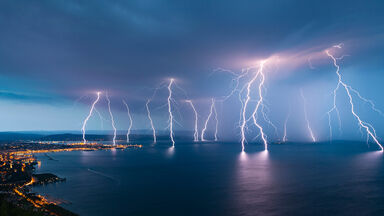The wells were first called artesian in the belief that the ascent of the water in them was due to the hydrostatic pressure of water at a higher level in the Queensland hills.
The naked cells which have been alluded to live in water, and call therefore for no differentiation in connection with this necessity; but those which are surrounded by a cell-wall always develop within themselves a vacuole or cavity which occupies the greater part of their interior, and the hydrostatic pressure of whose contents keeps tha protoplasm in contact with the membrane, setting up a condition of turgidity.
The great turgidity which is thus caused exerts a considerable hydrostatic pressure on the stele of the root, the vessels of the wood of which are sometimes filled with water, but at other times contain air, and this often under a pressure less than the ordinary atmospheric pressure.
The stretching of the cell wall by the hydrostatic pressure is fixed by a secretion of new particles and their deposition upon the original wall, which as it becomes slightly thicker is capable of still greater extension, much in the same way as a thick band of indiarubber is capable of undergoing greater stretching than a thin one.
This may possibly be the cell sap in their interior, which must exercise a slightly different hydrostatic pressure on the basal and, the lateral walls of the cells.





